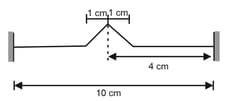Reflection of Waves
Important Questions on Reflection of Waves
What is meant by an echo? Explain.
Explain the reflection of transverse and longitudinal waves from a denser medium and a rarer medium.
A man stands before a large wall at a distance of and claps his hands at regular intervals. Initially, the interval is large. He gradually reduces the interval and fixes it at a value, when the echo of a clap merges with the next clap. If he has to clap times during every , find the velocity of the sound in air.
The harmonic wave travels along a string toward a boundary at with a second string. The wave speed on the second string is . Write expressions for reflected and transmitted waves. Assume SI units.
The pulse shown in figure has a speed of .
(a) If the linear mass density of the right string is that of the left string, at what speed does the transmitted pulse travel?
(b) Compare the heights of the transmitted pulse and the reflected pulse to that of the incident pulse.
A string that is long is fixed at both ends. At , a pulse traveling from left to right at is from the right end as shown in figure. Determine the next two times when the pulse will be at that point again. State in each case whether the pulse is upright or inverted.
A rope long is fixed at one end and tied to a light string of the same length at the other end. Its tension is .
(a) What are the wavelengths of the fundamental and the first two overtones?
(b) What are the frequencies of these standing waves?
[Note: In this case, fixed end is a node and the end tied with the light string is antinode.]
A wave pulse on a string has the dimensions shown in figure. The wave speed is .
(a) If point is a fixed end, draw the resultant wave on the string at and .
(b) Repeat part (a) for the case in which is a free end.
Two wires of different densities are soldered together end to end then stretched under tension . The wave speed in the first wire is twice that in the second wire.
(a) If the amplitude of incident wave is , what are the amplitudes of reflected and transmitted waves?
(b) Assuming no energy loss in the wire, find the fraction of the incident power that is reflected at the junction and fraction of the same that is transmitted.
In a stationary wave that forms as a result of reflection of waves from an obstacle, the ratio of the amplitude at an antinode to the amplitude at a node is What percentage of energy is transmitted?




